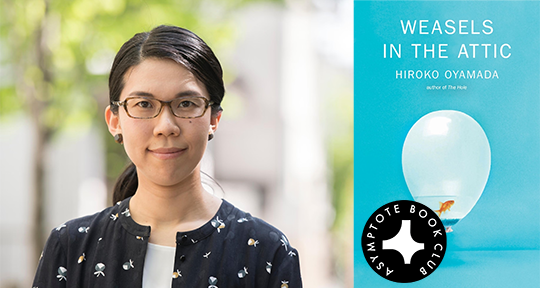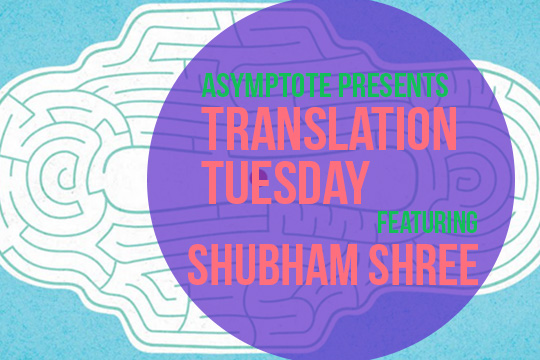After a long history of marginalization, unconventional narratives of gender, parenthood, and conception are coming to the forefront, representing a pivotal step forward as our conversations around these foundational matters continue to be rife with tumult, tensions, and inquiries. In this month’s Book Club selection, Weasels in the Attic, award-winning Japanese writer Hiroko Oyamada confronts the murky subject of family and childbearing with her signature command of the strange, weaving a narrative that encapsulates the surreality of these societal pressures. In her questioning of gender stereotypes and heteronormativity, Oyamada’s novella is a fascinating, disarming path through the psychology of not-yet parents, casting a dark suspicion onto the bright facade of nuclear familyhood.
The Asymptote Book Club aspires to bring the best in translated fiction every month to readers around the world. You can sign up to receive next month’s selection on our website for as little as USD15 per book; once you’re a member, join our Facebook group for exclusive book club discussions and receive invitations to our members-only Zoom interviews with the author or the translator of each title.
Weasels in the Attic by Hiroko Oyamada, translated from the Japanese by David Boyd, New Directions, 2022
Though Japan is famed for horror films of unsparing gore, I feel that the nation’s best stories of the uncanny are found in quieter narratives. Hiroko Oyamada’s Weasels in the Attic, translated by David Boyd, joins other globally famous Japanese authors like Yoko Tawada, Yukiko Motoya, Sayaka Murata in delivering a chill, caused not so much by overt implications of a world gone sideways than by the uneasy feeling that something is deeply wrong—something you can’t quite put your finger on.
Weasels in the Attic, Oyamada’s third volume from New Directions, also shares with Tawada, Motoya, and Murata a preoccupation with fertility and childlessness, two physio-sociological conditions gripping contemporary Japanese society as the population continues to shrink. While some politicians have acknowledged that reforms in work life and childcare are necessary to encourage population growth, blame is still often laid at the feet of women who supposedly prioritize career over family. In Weasels, however, the women of the story seem desperate to have children, while men are the ones expressing reservations or shock at the thought of starting a family. The narrator and his wife haven’t yet gotten pregnant, and she is increasingly frantic for a child while his interest is lukewarm at best. “I always tell her it’s her call,” the narrator explains to his male friends. “Then she comes back with all these pamphlets and websites . . . It’s the same thing every night. Then she asks me: ‘On a scale of one to ten, how badly do you want kids?’” The narrator’s qualms are further hampered by his possible impotency, something he refuses to investigate even when his wife hands him a sample cup point blank.
During a visit to friend-of-a-friend Urabe, the narrator holds Urabe’s newborn daughter and narrates her appearance: “The baby’s face was small and red. Her shut eyes looked like knife slits. I could feel her warmth and dampness through the layers of cloth.” In such a small child, there are already hints of the uncanny, of something lurking in the humid, murky depths. The moment the narrator relinquishes the baby to her mother, he becomes preoccupied with Urabe’s extensive exotic fish collection. Tanks fill Urabe’s home, and he and his wife breed the fish selectively, carefully—yet at the same time, unpredictably. “We still don’t fully understand the relationship between genotype and phenotype,” Urabe’s wife tells the narrator. “We haven’t been able to confirm which genes lead to which patterns. He says that’s why we need to experiment with different pairings—to see which combinations they produce.” In the course of rereading (which I would highly recommend with this text), this sentence rings differently, terrifyingly. Who precisely is experimenting with whom? And to what end? Is it Urabe experimenting with fish worth hundreds of dollars, or is it his uncanny wife—or more accurately, the mother of his child—experimenting with potential mates? After all, as we soon learn, she might possibly be the same girl he discovered in his storeroom dressed in nothing but underwear and a slip, eating bags of dried fish food. The reader, however, is never given clear confirmation of this fact; the shadowy depths of Weasels refuse any straightforward details. READ MORE…





